Music
BackMusic at Aylesford School Warwick focusses on the three main disciplines: Performing, Composing and Appraising. These three areas are the pillars in music education that creates the rounded musician.
Learning Journey
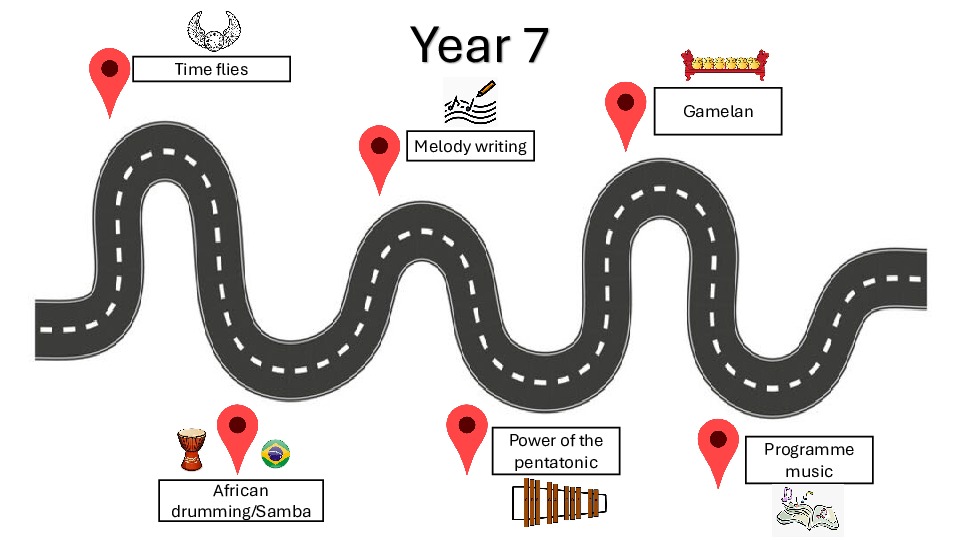
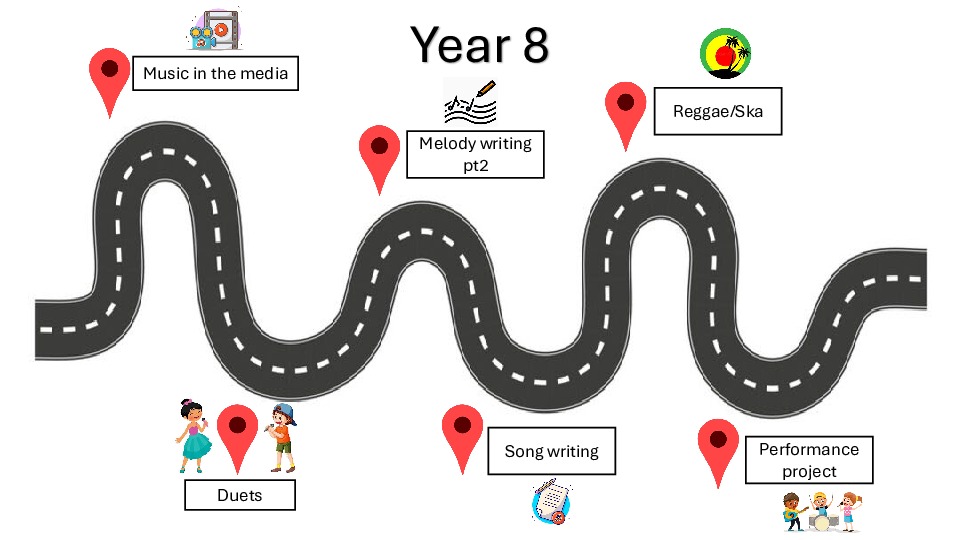
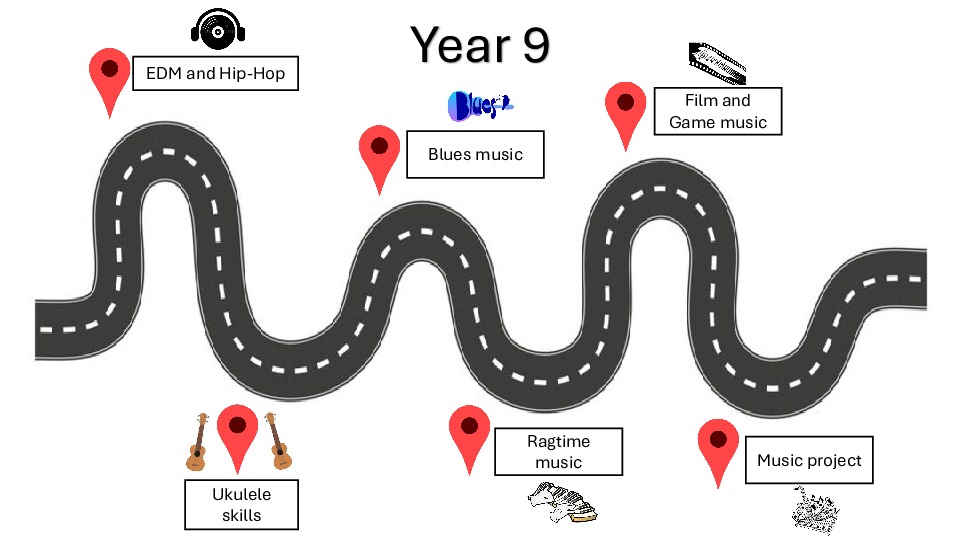
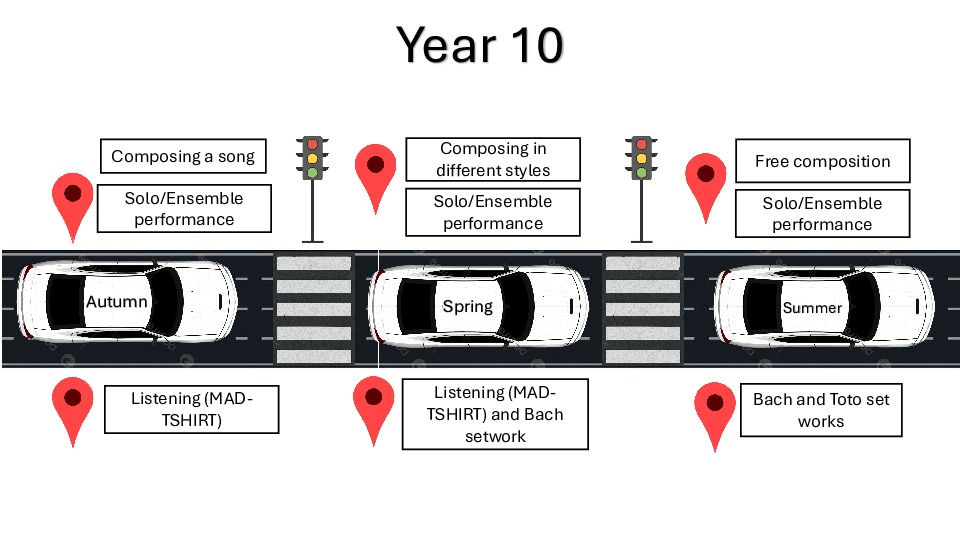
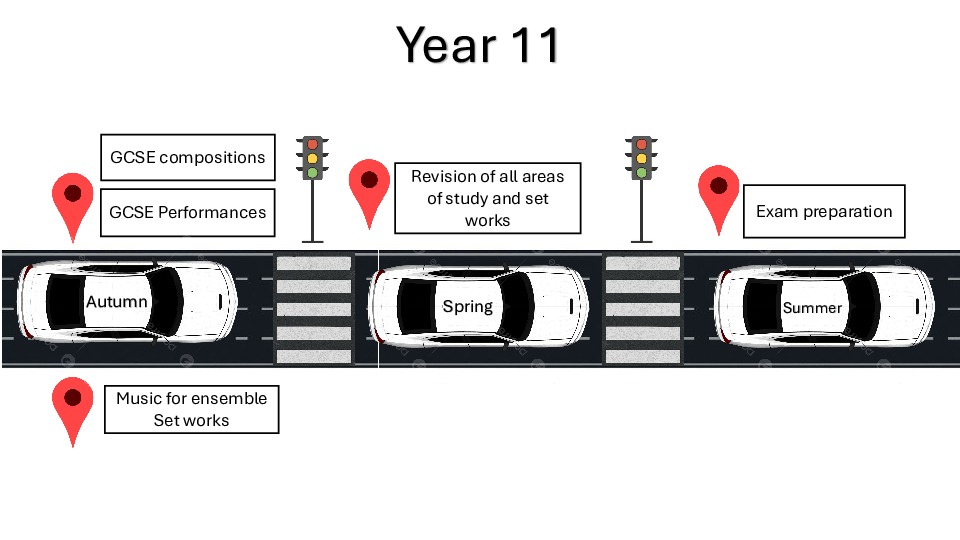
Curriculum Overview
| Year 7 | Term 1 | Term 2 | Term 3 |
|---|---|---|---|
| Key Topic: | Time flies and Rhythms of Africa/Samba | Melody writing and Power of the pentatonic | Gamelan and Programme music |
| New Knowledge: |
During Time Flies, students will learn the basic language of music through an understanding of the musical elements and how these can be manipulated. During African drumming, students will learn about African culture and how to read rhythmic notation scored for the djembe drum. They will further develop their understanding of texture, pitch and timbre. During Samba music, students will learn about the instruments used within the batería, the roles of these instruments and the hand signals used to conduct the batería ensemble. The first three topics provide the foundation for musical language and develop appraisal, composition, performance and ensemble-based skills. |
During melody writing, students will learn how to read and write competently using pitch notation. They will understand how to perform using a keyboard through applying professional methods. During power of the pentatonic, students will develop an understanding of scales through specifically learning the pentatonic scale and it’s use within the wider musical context. They will develop an understanding of both bass clef and time signature to enable the performance of more complex musical pieces scored for the left hand. |
In the first topic, students will learn about Gamelan music. This will include an understanding of Indonesian culture and knowledge of how to use tuned percussion. Throughout the programme music topic, they will develop their understanding of the musical elements to understand how music can be manipulated by the composer to match visual stimuli an tell a narrative. |
| Previous Knowledge Required: | Students will bring forward the musical knowledge learnt from primary school including the use of the musical elements. They will need to apply their understanding of texture and musical notation to learn African music and Samba music effectively. | Students will need to retrieve and apply their previously learned knowledge of how to read and write using basic pitch notation and the various note types that can be used within rhythm. | Students will require their understanding of musical notation and instrumental technique to aid the learning of more complex pieces of music. They will further apply their understanding of the musical elements to further analyse and compose music which has meaning. |
| New Skills | Students will develop instrumental skills using both body percussion and traditional African drumming technique. This will develop fine motor skills such as hand eye co-ordination and manual dexterity. Students will develop their composition skills through an understanding of notation and texture. They will develop ensemble performance related skills, this will include the key musical processes underpinning how we rehearse, perform and compose effectively in group-based settings. During Samba music, students will learn musical leadership, including how to conduct and direct an ensemble. | Students will learn keyboard skills, including how to perform different scales correctly using traditional methods. They will develop performance and composition skills using a developed understanding of musical notation. Students will also have the opportunity to develop independence through working solo and learning independent parts of the music. | Students will develop competency in reading and writing using musical notation and will develop ensemble-based skills through activities designed to encourage effective co-ordination with other members of a group. Students will develop instrumental skills using the keyboard and tuned percussion. During programme music, students will connect music and its meaning and therefore develop analytical and appraisal-based skills alongside critical thinking. |
| Links to the School Curriculum: |
English Maths Geography MFL |
English Maths MFL |
English Maths Geography R.E MFL Art |
| Independent Activities: | Students could continue working on the rhythms learn in lessons at home by clapping them. They could also teach other members of their family the different rhythms and create a family based rhythmic performance. Students could also visit the websites below to further deepen/consolidate their learning of rhythms. Some of these links provide opportunities to use online software to create your own rhythms. | Students can continue developing this knowledge through accessing the Youtube links below. Students can also find pieces of music on “Sheet music direct” and annotate them by writing the pitch letter underneath each note, deepening their understanding of pitch and reading music. These pieces can be practised using the virtual keyboard online. | Students can continue composing short melodic ideas at home using the virtual keyboard online or the “tone matrix”. They could write more advanced music using websites such as “noteflight” and “bandlab”. Students can also deepen their knowledge of melody writing through watching the Youtube links below. |
| Web Links: | www.mymusictheory.comhttps://www.youtube.com/watch?v=6zyv0O7kfcchttps://www.youtube.com/watch?v=7l9X-K1_pNshttps://www.youtube.com/watch?v=rTKTpY6PJL8https://www.youtube.com/watch?v=bY-GXTxNa4ohttps://io808.com/https://roland50.studio/
|
https://www.sheetmusicdirect.com/https://www.onlinepianist.com/virtual-pianohttps://www.youtube.com/watch?v=7l9X-K1_pNshttps://www.youtube.com/watch?v=Iya1kIw7FREhttps://www.youtube.com/watch?v=hJHePlu9zoUhttps://www.youtube.com/watch?v=7Bv-JiFnoJ4https://www.youtube.com/watch?v=Z40fcNNvu0E | https://www.onlinepianist.com/virtual-pianohttps://tonematrix.maxlaumeister.com/https://musescore.com/https://www.noteflight.com/https://edu.bandlab.com/https://www.youtube.com/watch?v=yrL6f2M2aFchttps://www.youtube.com/watch?v=m7xLWByiKMMhttps://www.youtube.com/watch?v=75S51R7s2R8https://www.youtube.com/watch?v=skeQak7jsNg |
| Year 8 | Term 1 | Term 2 | Term 3 |
|---|---|---|---|
| Key Topic: | Music and the media and Duets | Melody writing and song writing | Reggae and Ska and performance project |
| New Knowledge: |
During Music and the media, students will develop their understanding of rhythm through the exploration of more complex rhythms and will explore different tonalities, including major and minor. During duets, students will develop an understanding of Latin American music and how accidentals are used within music. They will further deepen their knowledge of sharps and flats alongside how this operates within different key signatures. |
In Melody writing, students will learn the considerations for composing an effective melody which can fit over an existing harmony, this will include how to play over chords and use auxiliary notes. In Song writing, they will develop this understanding to write music in the Pop genre. This will include, Bass/chords/riffs, four chord progressions, structure and phrasing alongside the use of the relative minor. |
In Melody writing, students develop an understanding of the stylistic features of both Reggae and Ska music. This includes the use of rhythm alongside key instrumentation and their roles. During the performance project, students bring forward their musical understanding including musical notation and instrumental ability to learn and develop a study piece for a project. |
| Previous Knowledge Required: | Students will need to bring forward, their understanding of cyclic patterns, rhythmic and pitch notation, the musical elements, tonality and how music can be written for the bass clef. | Students will use their knowledge of musical notation and tonality to learn how to compose melodies. They will build on their melody writing knowledge to compose Pop music. | Students will need to bring forward their understanding of chords, rhythm and musical notation. They will need to bring forward and develop their skills in playing the keyboard and singing. |
| New Skills | Students will develop their ability to perform complex rhythmic ideas and develop the confidence to compose musical ideas over a bass line using the correct key and therefore will develop the ability to harmonise effectively. They will develop ensemble skills through consistent practise within a duo, therefore developing synchronicity. They will develop instrumental ability as key concepts will be taught through performance and composition on the keyboard. | Students will develop new musical thinking skills to be able to write an effective melody, this includes harmonisation and critical musical thinking to determine if musical ideas are effective or need adapting. They will continue to develop ensemble skills, performance skills, composition skills and develop singing abilities. They will develop instrumental skills and ensemble skills through learning melody and accompaniment styles through paired/group based pop music projects. | Students will develop performance and instrumental skills through the performance of both off beat chord rhythms and complex bass patterns which are scored for the bass clef. They will develop dexterity through changes in hand position required to play Reggae pieces. Students will also develop ensemble skills through playing complex parts in time with their partner. Throughout the project students will develop independence through developing independent parts, they will also learn project management skills through managing an end of year project. |
| Links to the School Curriculum: |
English Maths Spanish Media studies Psychology |
English Maths
|
English Maths R.E |
| Independent Activities: | Students can practise synchronisation skills through using the “PHianonize” Youtube channel to play along with specific pieces. They could use the virtual piano “onlinepianist” and learn which keyboard letters trigger which musical notes. Students could use online software such as “Noteflight” and “Flat” to compose musical ideas, this could include short jingles and themes. | Students can use online music making software such as “Bandlab, Notelfight and Flat” to effectively compose short effective melodies with an underlying harmony. The following Youtube links provide an advanced insight into writing melodies over chords. The “Axis of awesome” shows how many Popular songs use the “4 chord progression”. | Students can further deepen their understanding of Reggae music through actively listening to key artists such as Bob Marley, Gregory Isaacs and Toots and the Maytals. They can develop performance skills through the virtual keyboard online. |
| Web Links: | https://www.youtube.com/@PHianonizehttps://www.onlinepianist.com/virtual-pianohttps://www.noteflight.com/https://flat.io/en-GBhttps://edu.bandlab.com/ | https://www.bandlab.com/?lang=enhttps://www.noteflight.com/https://flat.io/en-GBhttps://www.youtube.com/watch?v=U2Y9nVpqxF4https://www.youtube.com/watch?v=jA7gdz56LtYhttps://www.youtube.com/watch?v=oOlDewpCfZQ | https://www.onlinepianist.com/virtual-pianohttps://www.youtube.com/watch?v=wNxNwvjzGM0https://www.youtube.com/watch?v=g3t6YDnGXAchttps://www.youtube.com/watch?v=LanCLS_hIo4 |
| Year 9 | Term 1 | Term 2 | Term 3 |
|---|---|---|---|
| Key Topic: | EDM and Ukulele skills | Blues Music and Ragtime | Film and game music and Music project |
| New Knowledge: |
Students will learn about various styles of Electro-dance music and the musical features that define each style. They will gain an understanding of the musical features of Hip hop lyrics and the processes for composing modern hip hop beats and writing lyrics. During Ukulele skills, they will learn about the anatomy of the Ukulele and will develop an understanding of how to play pitched notes on this instrument. They will learn how to read tablature scored for the ukulele and ukulele chord charts. |
In this term, students will develop their contextual understanding of the Blues music including the musical features and history behind the development of the Blues style. Students will also learn the history of Ragtime music and the musical features including new styles to accompany melody on the keyboard. Students will further understand the use of intervals and chord construction to understand blues structures and ragtime accompaniment styles. |
In this term students will understand how film composers effectively compose for cinema and how game programmers consider musicality into game programming. Students will learn how to manage a project effectively to drive to clear and successful end goals. |
| Previous Knowledge Required: | Students will require knowledge of pitch notation to learn the tablature system for reading Ukulele music. They will require this knowledge to learn EDM and Hip-hop styled pieces. Students will also need to bring forward their understanding of the musical elements to analyse the key musical features of EDM and Hip-hop music. | Students will use their existing knowledge of chords, rhythm and tonality to perform Blues and Ragtime music. They will draw upon both their keyboard and ukulele skills to further develop instrumental control and perform new styles of music. | Students will need to take forward their understanding of the musical elements to analyse and compose film music using a wide range of compositional techniques. They will draw upon their instrumental techniques developed throughout the past three years to compose using chord sequences, rhythms and scales. |
| New Skills | Students will develop motor skills, ensemble and solo performance skills through performing new pieces. They will learn new instrumental skills through learning how to play the ukulele. | Students will learn how to transpose key musical ideas and will learn compositional devices used in Ragtime and Blues music such as question and answer. Students will develop their composition skills and understanding of rhythm to create more complicated melodies. Students will develop dexterity and hand eye co-ordination through performing melody and accompaniment at the same time. | Students will develop compositional skills to successfully compose for a brief. They will develop instrumental skills and ability to analyse music in depth using key music terminology. Students will develop independence, ensemble and project management skills throughout the end of year project. |
| Links to the School Curriculum: |
English Maths ICT |
English Maths History
|
English Maths Psychology Media studies IT |
| Independent Activities: | Students can continue developing their sheet music skills by using the links below. They can develop their understanding of various styles of EDM through active listening. They can use online software such as Bandlab to create loops. | Students can continue developing their keyboard skills by access an online keyboard (link below). They can learn about the in-depth history of the Blues music using the Youtube link below. | Students can continue analysing music at home using the musical elements. Online software such as noteflight and Bandlab can be used to compose music to suit films or games. |
| Web Links: |
https://www.onlinepianist.com/virtual-piano https://www.youtube.com/watch?v=ac8khiLO-JEhttps://www.youtube.com/watch?v=WSeNSzJ2-Jwhttps://www.bandlab.com/ |
https://www.onlinepianist.com/virtual-pianohttps://www.youtube.com/watch?v=_OXgWmPCC1Uwww.mymusictheory.com |
https://www.onlinepianist.com/virtual-pianohttps://www.bandlab.com/?lang=enhttps://www.noteflight.com/https://www.youtube.com/watch?v=xRAce8GTx_8
https://www.youtube.com/watch?v=dW9xbFLaatU&list=PLM_QcmObjHErjwwlM6C7iyO0vLx4KL1dc |
| Year 10 | Term 1 | Term 2 | Term 3 |
|---|---|---|---|
| Key Topic: |
Performance: Solo & Ensemble Skills Composition: Composing a Song Listening: MAD T-SHIRT |
Performance: Solo & Ensemble Skills Composition: Composing in different styles Listening: MAD T-SHIRT & Bach Set Work |
Performance: Solo & Ensemble Skills Composition: Free Composition Listening: Bach and Toto Set Works |
| New Knowledge: | In performing, students will learn how to practise, perform and evaluate their role as a soloist and as part of an ensemble against the GCSE assessment criteria. In composition, students learn how to compose a song from writing a catchy hook, bass line, chord pattern, beats and memorable melody. In listening, students start studying the elements of music, the theory and how to identify them by ear. | In performing, students will learn about the Music Technology pathway for both performance and composition, broadening their options for their NEA work. In listening, students will learn how to analyse a piece of classical music in relation to their set work section of their exam. |
In performing, students will learn how to improve their performances from the beginning of year 10 and finalise their choice of performance pathway in readiness for their performance NEA. In composition, students will learn how to start their free composition NEA and develop it throughout this term. In listening, students will start analysing their second set work. |
| Previous Knowledge Required: | Students will use all knowledge gained in KS3 to help start their GCSE journey. | Students will need their Music Technology knowledge and skills from KS3 in order to access this terms learning for performance and composition. Students will also need their knowledge of composition from last term and their arrangement knowledge from year 9 to aid their learning this term. Regarding listening, students will use their knowledge from last term to continue their learning of MAD T-SHIRT. | Students will need all knowledge learnt in both performance and composition to complete their work this term. For listening, students will need their knowledge of Bach to complete their analysis of this set work. |
| New Skills | Students will develop their instrumental skills in relation to the GCSE specification requirements as well as their solo and ensemble skills. Students will also develop their composition skills by writing musical ideas for a range of instruments and ensembles including writing a song for a pop band. For listening, students will learn how to analyse elements of music and learn how to listen to specific areas of music as opposed to music as a whole. | Students will learn how to compose a piece of music using Music Technology as well as using its features to create a performance. Students will continue developing their aural and analytical skills in regarding to listening and their set works. | Students will develop their performance, composition and analytical skills in relation to their NEA and set works. |
| Links to the School Curriculum: |
English Maths History
|
English Maths History
|
English Maths History |
| Independent Activities: | Students should be practising their chosen pieces of music on their instruments on a regular basis. Students can continue practising their composition skills using the links below or from their lessons via manuscript paper or free notation software such as musescore. For listening, students should be revisiting their new knowledge regularly. | Bandlab for education can be accessed at home using their login details. Students will be then able to consolidate their learning or develop it. Students can continue practising their composition skills using the links below or from their lessons via manuscript paper or free notation software such as musescore. For listening, students should be revisiting their new knowledge regularly. | Students should be practising their chosen pieces of music on their instruments or using Music Technology on a regular basis. Students can continue practising their composition skills using the links below or from their lessons via manuscript paper or free notation software such as musescore. For listening, students should be revisiting their new knowledge regularly. |
| Web Links: | https://resources.eduqas.co.uk/Pages/ResourceSingle.aspx?rIid=1446 www.mymusictheory.com |
www.mymusictheory.com |
www.mymusictheory.com |
| Year 11 | Term 1 | Term 2 | Term 3 |
|---|---|---|---|
| Key Topic: |
Performance: GCSE Performances Composition: GCSE Compositions Listening: Music for ensemble and set works |
Revision of all areas of study and set works |
Exam preparation |
| New Knowledge: | In performance, students will be completing their solo and ensemble performances as part of their NEA. In composition, students will learn how to compose to a set brief and will complete both a free composition and brief composition. In listening, students will complete their analysis of Africa by Toto and focus on film music in readiness for their mock exam. Students will also study area of study 2: music for ensemble. Here they will explore how music can be performed in a variety of contexts, for example Jazz bands, chamber orchestras and string quartets. They will also revisit the Bach set work. | In this term, students will revisit topics and revise key areas based on their mock exam results. They will explore exam style questions in preparation for the end of year exam. |
Students will focus on being prepared for their GCSE listening exam. |
| Previous Knowledge Required: | Students will use their existing knowledge of Toto Africa to further analyse the piece. They will apply their knowledge of the musical elements for this set work analysis and to analyse how music can create meaning within film music. They will apply theory from Year 10 such as compositional devices to be able to compose and finalise two compositions. | Students will need to apply their knowledge learned so far to retrieve key concepts and apply understanding to exam style questions to improve exam style technique. | Students will need to apply their knowledge learned so far to retrieve key concepts and apply understanding to exam style questions to improve exam style technique. |
| New Skills | Students will develop both their composition and performance related skills to complete composition and performance coursework.. | Students will learn revision skills and how to revise effectively for their upcoming listening exam. They will develop exam style technique required to answer exam style questions with success. | Students will learn revision skills and how to revise effectively for their upcoming listening exam. They will develop exam style technique required to answer exam style questions with success.. |
| Links to the School Curriculum: |
English Maths History
|
English Maths History
|
English Maths History |
| Independent Activities: | Students should be practising their performances at home in preparation for their recordings. Students can also compose ideas for their NEA work at home using manuscript or free notation software such as musescore. Students should be revising their listening knowledge in preparation for their mock exam. Students should also be attending composition club and practising performance pieces in the Music department. | Students should be revising their listening knowledge in preparation for their final exam. Students should be attending revision sessions held by the department. | Students should be revising their listening knowledge in preparation for their final exam |
| Web Links: |
https://www.bbc.co.uk/bitesize/examspecs/zbmct39 https://resources.eduqas.co.uk/Pages/ResourceSingle.aspx?rIid=1445https://resources.eduqas.co.uk/Pages/ResourceSingle.aspx?rIid=1444https://resources.eduqas.co.uk/Pages/ResourceSingle.aspx?rIid=716https://resources.eduqas.co.uk/Pages/ResourceSingle.aspx?rIid=1508https://resources.eduqas.co.uk/Pages/ResourceSingle.aspx?rIid=1508https://www.youtube.com/c/MusicMattersGB/videos?view=0&sort=dd&shelf_id=0www.mymusictheory.com |
https://www.bbc.co.uk/bitesize/examspecs/zbmct39
https://resources.eduqas.co.uk/Pages/ResourceSingle.aspx?rIid=1445https://resources.eduqas.co.uk/Pages/ResourceSingle.aspx?rIid=1444https://resources.eduqas.co.uk/Pages/ResourceSingle.aspx?rIid=716https://resources.eduqas.co.uk/Pages/ResourceSingle.aspx?rIid=1508https://resources.eduqas.co.uk/Pages/ResourceSingle.aspx?rIid=1570https://www.youtube.com/c/MusicMattersGB/videos?view=0&sort=dd&shelf_id=0 |
https://resources.eduqas.co.uk/Pages/ResourceSingle.aspx?rIid=1445
https://www.bbc.co.uk/bitesize/examspecs/zbmct39https://resources.eduqas.co.uk/Pages/ResourceSingle.aspx?rIid=1444https://resources.eduqas.co.uk/Pages/ResourceSingle.aspx?rIid=716https://resources.eduqas.co.uk/Pages/ResourceSingle.aspx?rIid=1508https://resources.eduqas.co.uk/Pages/ResourceSingle.aspx?rIid=1570 |

